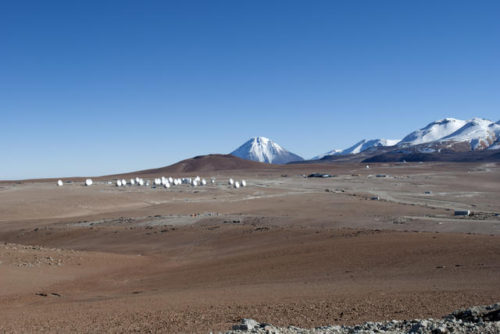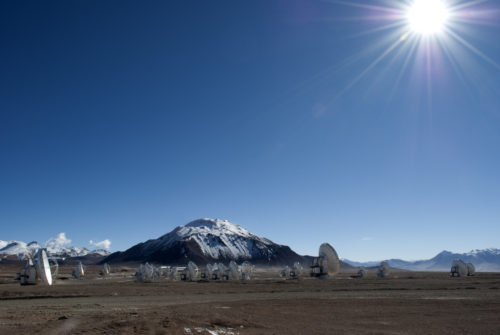Halfway There: 33 ALMA Antennas on Chajnantor
On the 5,000 meters altitude Chajnantor plateau in northern Chile, construction of the Atacama Large Millimeter/submillimeter Array (ALMA), the most complex ground-based astronomy observatory in the world, continues apace. On 12 May 2012, another ALMA antenna was carried up to Chajnantor, bringing the total on the plateau to 33 for the first time. This marks a halfway point for ALMA, as the telescope will have a total of 66 antennas when completed in 2013. The giant antennas, fifty-four 12-meter-diameter dishes, and twelve 7-meter-diameter dishes, use sensitive receivers to detect millimeter- and submillimeter-wavelength light from the cosmos.
The first of the antennas made the trip up to Array Operations Site at the Chajnantor plateau in September 2009. Now, as ALMA approaches completion, antennas are arriving at an increasing rate.
The state-of-the-art ALMA antennas, which weigh about 100 tons each, need a custom-constructed transporter vehicle to move them between the Operations Support Facility, located at 2,900 meters altitude and the higher Array Operations Site. ALMA has two transporters — massive machines named Otto and Lore — that are 20 meters long, 10 meters wide and 6 meters high, and each has 28 tyres. They are also used to move the antennas between positions on the plateau. The minimum distance between antennas is 15 meters and they can be all positioned within a radius of 150 meters, or spaced up to 16 kilometers apart. This gives ALMA a powerful variable “zoom” capability.
Although not all the antennas have arrived at Chajnantor, ALMA is already operating and making Early Science observations with a partial array. ALMA is the most powerful telescope for observing the cool Universe — molecular gas and dust as well as the relic radiation of the Big Bang. With ALMA, astronomers are studying the building blocks of stars, planetary systems, galaxies, and life itself.

Halfway There: 33 ALMA Antennas on Chajnantor
On 12 May 2012, another Atacama Large Millimeter/submillimeter Array (ALMA) antenna was carried up to the 5000-meter plateau of Chajnantor, bringing the total on the plateau to 33. This marks a halfway point for ALMA, as the telescope will have a total of 66 antennas when completed in 2013. At present, the antennas are located all together at the so-called “central array”, except one, far right on the picture, situated 1,966 meters away from the others, which allows doing tests of longish baselines.
Credit: ALMA (ESO/NAOJ/NRAO), J. Guarda (ALMA)

Halfway There: 33 ALMA Antennas on Chajnantor
On 12 May 2012, another Atacama Large Millimeter/submillimeter Array (ALMA) antenna was carried up to the 5000-meter plateau of Chajnantor, bringing the total on the plateau to 33. This marks a halfway point for ALMA, as the telescope will have a total of 66 antennas when completed in 2013. At present, the antennas are located all together at the so-called “central array”, except one, far right on the picture, situated 1,966 meters away from the others, which allows doing tests of longish baselines.
Credit: ALMA (ESO/NAOJ/NRAO), J. Guarda (ALMA)

Halfway There: 33 ALMA Antennas on Chajnantor
On 12 May 2012, another Atacama Large Millimeter/submillimeter Array (ALMA) antenna was carried up to the 5000-meter plateau of Chajnantor, bringing the total on the plateau to 33. This marks a halfway point for ALMA, as the telescope will have a total of 66 antennas when completed in 2013. At present, the antennas are located all together at the so-called “central array”, except one, far right on the picture, situated 1,966 meters away from the others, which allows doing tests of longish baselines.
Credit: ALMA (ESO/NAOJ/NRAO), J. Guarda (ALMA)



